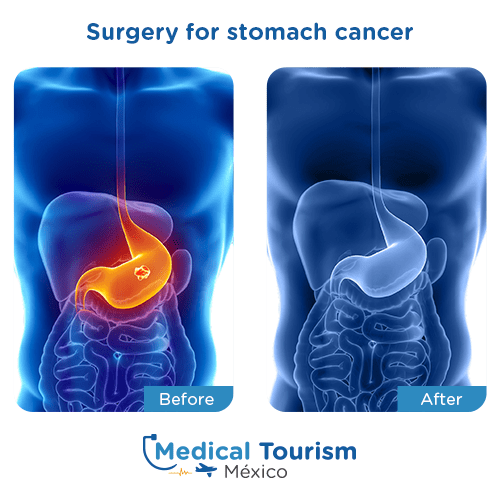The most reliable doctors in Mexico
Stomach cancer - Gastrectomy information and locations in Mexico
Stomach cancer or gastric cancer can begin in any part of the stomach, causing different
symptoms and outcomes. The most common type of cancer are adenocarcinomas, gastrointestinal
stromal tumors (GISTs), neuroendocrine tumors (NETs), and lymphomas.
A gastrectomy is a major surgery that involves the partial or complete removal of a patient’s
stomach, depending on the cancer location and aggressiveness, surgeons can up to remove a part
of the small intestine or esophagus.
Surgical approaches to gastrectomy
Open surgery
A large incision is made over the patient’s stomach. This procedure is preferred to
treat advanced cancer as it allows the easier removal of the affected areas.
Minimally invasive surgery
Also known as “laparoscopic surgery”, the specialists make small cuts on the abdomen,
special surgical instruments are used to remove cancer. Some specialists can use robotic
surgery.
Get wide local excision with the best oncologists in Mexico!
Benefits
Can help to remove most of the cancer
Can often lead to weight loss
Reduces the risk of recurrence
Keyhole surgery is becoming more common
Can often lead to weight loss
Reduces the risk of recurrence
Keyhole surgery is becoming more common
Stomach cancer
Procedure:
4 hrs.
Hospital stay: 4 - 5 hrs.
Cleared to fly: 7 - 10 days
Hospital stay: 4 - 5 hrs.
Cleared to fly: 7 - 10 days
After surgery
Out of town patients’ follow-ups are scheduled with the surgical oncologist after 7 - 15 days from stomach cancer
surgery. Patients are clear for flying after 7 - 10 days from stomach cancer surgery.
Note: Follow-ups can be arranged as face-to-face or virtually. If needed, you can go to your primary care physician to remove sutures or get medication adjustments.
As an Amazon Associate, we earn from qualifying purchases.
Take a look at one of our medical tourism essentials for oncology surgery.
Take a look at one of our medical tourism essentials for oncology surgery.
Before and after images
View additional images for this procedure.

View more


Locations
Select the city of your choice to seethe doctors profile.
Chihuahua, Chih.
Dr. Carlos M. Núñez
View more

Stomach cancer - Gastrectomy frequent questions
Get answers to our most frequently asked questions and what to expect after the surgery.
Am I a candidate for a gastrectomy?
Gastrectomies can be used to treat a wide variety of conditions, including stomach cancer. We recommend you to refer to one of our surgical oncologists for an evaluation to determine if you are a candidate for surgery.
How do I prepare for gastrectomy?
Your doctor will ask you to stop smoking immediately and to refrain from doing it after the procedure. In addition, you will not be allowed to eat or drink anything between 4 or 6 hours before the procedure.
Which kind of surgery will I get?
After performing an examination, the surgeon will inform you which procedure will lead to the best results; open surgery is preferred for more advanced forms of cancer, while minimally invasive surgery is the main technique used to partially remove the stomach.
How much of my stomach needs to be removed?
This depends on the extent of cancer, most patients only need a partial removal to eliminate cancer from the affected area, the results are similar to some bariatric surgeries. A total gastrectomy is performed when cancer has spread through the entire stomach, on this surgery the esophagus and the small intestine are directly connected to maintain as much of the digestive process as possible.
How will my diet change after surgery?
Both surgeries have the same dietary precautions, these include avoiding sugary drinks and avoiding high-fiber foods, and taking vitamin and mineral supplements to maintain your health.
Recent news
Disclaimer: This information does not reflect the medical advice from our clinics. All cases are different and this treatment may not suit you. Always refer to a medical professional with the certification and experience. All of our physicians are fully qualified to perform these procedures. For more information and diagnosis contact one of our top specialized clinics.
In all medical procedures, there are chances of complications, the specialist will provide you detailed information about the risks of the procedure, talk to the specialist directly.
In all medical procedures, there are chances of complications, the specialist will provide you detailed information about the risks of the procedure, talk to the specialist directly.





